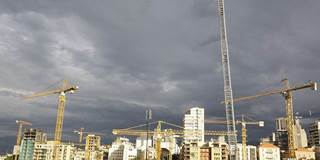Now that Lebanon, after two and a half years, finally has a president, the country can turn its attention to exploiting its hydrocarbon reserves. But policymakers must be mindful of the risks ahead – and build the governance institutions needed to manage fossil-fuel wealth properly.
BEIRUT – After two and a half years without a president, Lebanon’s Parliament has elected Michel Aoun to the post. Now, Lebanon can turn its attention to oil and gas production, with policymakers’ expectations running high – verging on irrational exuberance – that an energy windfall will jumpstart the country’s economy, which has suffered from poor political and economic governance and the spillover effects from Syria’s civil war.

BEIRUT – After two and a half years without a president, Lebanon’s Parliament has elected Michel Aoun to the post. Now, Lebanon can turn its attention to oil and gas production, with policymakers’ expectations running high – verging on irrational exuberance – that an energy windfall will jumpstart the country’s economy, which has suffered from poor political and economic governance and the spillover effects from Syria’s civil war.